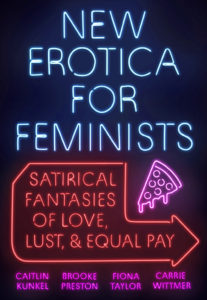 If you haven’t visited comedy site The Belladonna, “a comedy and satire site by women and other marginalized genders, for everyone,” go check it out.
If you haven’t visited comedy site The Belladonna, “a comedy and satire site by women and other marginalized genders, for everyone,” go check it out.
No really, we’ll wait.
.
.
Okay, come back now. You’re welcome.
We are excited to present comedy writer Caitlin Kunkel, co-founder of The Belladonna and co-author of NEW EROTICA FOR FEMINISTS. Kunkel will appear in-conversation with local comedian and journalist Gwen Filosa Saturday, January 19, at 6pm, followed by a book signing.
 Kunkel is visiting Key West for the first time and we had a chance to ask her a few questions about transforming a web-post into a book, staying busy and checking out iconic movie locations.
Kunkel is visiting Key West for the first time and we had a chance to ask her a few questions about transforming a web-post into a book, staying busy and checking out iconic movie locations.
Q. Tell me a little bit about The Belladonna. How did it come to be? How did you come to be working with your partners? Besides being funny, what’s your goal with the site?
A. The Belladonna is a site that features comedy and satire written by women, for everyone. The four co-founders (myself, Brooke Preston, Fiona Taylor, and Carrie Wittmer) were each part of a private Facebook group for female comedy writers, and there was increasing discussion about how there seemed to be a dearth of reputable satire sites that accepted outside submissions from contributors, and even fewer that celebrated or nurtured specifically women’s talents and voices.
A number of members in that group mentioned they’d stopped writing comedy entirely, because their early efforts had been met with unnecessarily cliquish or exclusionary behavior, or negative feedback, or no feedback at all. Other members had occasionally piped in to suggest that women from that group should start their own publication, but no one had taken the reins.Then in November 2016, Carrie posted “I want to start a website, who wants to start one?” I responded, so did Fiona, and I looped in Brooke who I knew in real life. So it was completely chance how to came to be – we just each had the same purpose and desire! We actually ran the site and got the book deal prior to all four being in the same room together. So a lot of trust and remote working was involved!
Our goal is to provide a space where beginning writers can get feedback (we tell every submission why it’s not right for us), and writers at all stages of their careers can benefit from a growing platform to showcase their unique voices.
Q. How did you come to write the original post that became NEW EROTICA FOR FEMINISTS? Any hint that it would take off the way it did? What’s your sense of what captured people’s imagination and made it go viral?
A. It truly felt like the piece chose us! We were deep in daydream schemes about how to potentially monetize The Belladonna (a frequent topic of conversation for us), cheekily dreaming about having our favorite flavored sparkling water company (LaCroix–wildly popular in the US, a real cult following) somehow just foot the bill for everything and send us truck upon truck of the stuff. And why not have, say, Tom Hardy make those deliveries? Is that not how corporate sponsorship works? Perhaps we don’t understand commerce after all.
One of us said (in jest) ‘you know, that’s our million dollar idea–that sounds like erotica the women of New York would pay good money for’. We decided then and there to write a comedy piece in that vein–what would erotica for feminist women look like–and it flowed out of us so quickly and naturally as we realized all the ways actual romance and porn tropes are in service to traditionally cisgender male desires and urges, and the women are largely there as objects to be had rather than protagonists.
We did NOT expect it to go viral – we wrote the whole thing in about a day, and we thought we would get some views back to The Belladonna from McSweeney’s [where the piece was published], but that was about as big as we dreamed. It started to take off the same day it was published, and then we watched, mouths agape, as it kept spreading. We think that the format of erotica lets people slip into each vignettes themselves, and the central of ideas of fantasies that should be reality can be expanded to SO many different scenarios and areas of life. So people could appreciate the piece, but also appreciate the main satirical point of view pretty easily.
Q. What was the expansion/revision process like? What does the book do that the original post couldn’t?
A. One of the interesting things we saw in the response to the initial McSweeney’s piece was that people tended to prefer completely different vignettes for different reasons. Typically in a humor piece, there are a few lines that people cluster around, but here, different elements were sticking out to people. So looking at the initial group of 12, as well as our early brainstorms of new material to put into the proposals, we started to see groups and methods of classifying them. There were a lot that skewed pop culture, we knew we wanted to touch on parenting, and being able to look at historical sources gave us a lot of inspiration. Building out a table of contents helped us show publishers how this 800-word piece could become a 10,000 word-plus book. We could then also brainstorm and write around each chapter heading and see where we needed more and less entries, rather than write an amorphous bunch of jokes and try to organize them.
The book also let us write some significantly longer vignettes, mostly in the Historical and Literary sections. It’s hard to do a literary parody of Lolita in four lines, so having a little more space to have a clear point of view really helped! It also lets you vary tone a bit more – in a piece with 12 vignettes, they each have to play the game pretty clearly to fit together. But the 47th vignette in the middle of the book could break format a little, or be weirder. So it let us build in more variety.
Q. What are you reading and recommending?
As we wrote our comedic book, I read a lot a serious books on women and/or society this year! The three that stood out to me were Men Explain Things to Me by Rebecca Solnit, Good and Mad by Rebecca Traister, and So You Want to Talk About Race by Ijeoma Oluo. Each of these is excellently written with the author’s particular voice clearly shining through.
For fiction, I’m a huge Stephen King fan (I thank him in the acknowledgments of the book!), and I reread The Stand this year, as I do most years. I loved Carmen Maria Machado’s Her Body and Other Parties, which is like feminist sci-fi/dystopian fiction, and in somewhat of that same vein I truly enjoyed the thought experiment of reading Naomi Alderman’s excellent book The Power.
Q. What are you working on now?
A. We’re working on continuing to grow The Belladonna and create more opportunities for women in comedy! Personally, I’m taking a hiatus from teaching satire, which I’ve done for The Second City in Chicago via online teaching for seven years, and I’m focusing on my own writing full-time. I’m the writer for Live Wire Radio, a variety show that airs on public radio across the country, and that is extremely fun and challenging job. I’m also one of the producers of the very first Satire and Humor Festival, coming to NY in March of 2019! And I’m continuing to tour and talk about the book. So I’m focusing on my own writing as well as community building. I love to keep busy.
Q. Have you been to Key West before? What are you most looking forward to here?
A. I have NEVER been to Key West, and I just want to walk to the end and stare out over the ocean at the southernmost point of the continental US! I grew up in Rhode Island, and being close to the water never ceases to give me a major thrill. I also saw the movie True Lies pretty young, and the iconic scenes on the Overseas Highway gave me an appetite to drive on that road someday.
~ Robin Wood, Associate Manager
